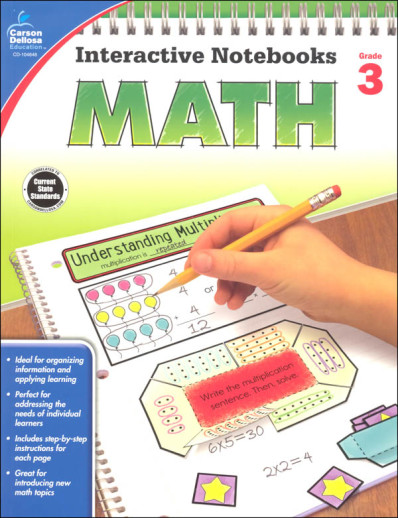We use cookies to make your experience better. To comply with the new e-Privacy directive, we need to ask for your consent to set the cookies. Learn more.
Interactive Notebooks: Math - Grade 3
Time-Saving interactive notebook templates that allow students to show what they know!
In Interactive Notebooks: Math for third grade, students will complete hands-on activities about place value, multiplication, fractions, graphing, area, quadrilaterals, and more.
This book is an essential resource that will guide you through setting up, creating, and maintaining interactive notebooks for skill retention in the classroom. High-interest and hands-on, interactive notebooks effectively engage students in learning new concepts. Students are encouraged to personalize interactive notebooks to fit their specific learning needs by creating fun, colorful pages for each topic. With this note-taking process, students will learn organization, color coding, summarizing, and other important skills while creating personalized portfolios of their individual learning that they can reference throughout the year.
An interactive notebook is a colorful, sometimes 3D, way of taking notes and remembering important things that may involve drawing, doodling & diagrams to help the student retain information in a way that makes sense to them. Because it is so personalized, students become actively involved in their note taking and it can be adapted for various age/learning levels. It can take as much or as little time as you like.You might make a notebook page only at the beginning of a unit, or perhaps one for each topic. These books are a guide for formatting and for grade level content to include in your notebook, though this can easily be varied. Students are encouraged to make their own choices about the look of their pages. A grading rubric helpsteachers and homeschooling parents assess the student's work. You can begin with a spiral notebook, a composition book or a 3 ring binder with loose leaf paper. Thecontent in each grade level aligns to current state standards and gives you something to work with. Reproducible for one classroom, co-op or family. Homeschoolers may recognize this method as lapbooking. 96 pgs, pb.
| Product Format: | Paperback |
|---|---|
| Brand: | Carson-Dellosa |
| Grade: | 3 |
| ISBN: | 9781483824796 |
| EAN/UPC: | 044222245696 |
| Length in Inches: | 10.8125 |
| Width in Inches: | 8.375 |
| Height in Inches: | 0.25 |
| Weight in Pounds: | 0.65 |

